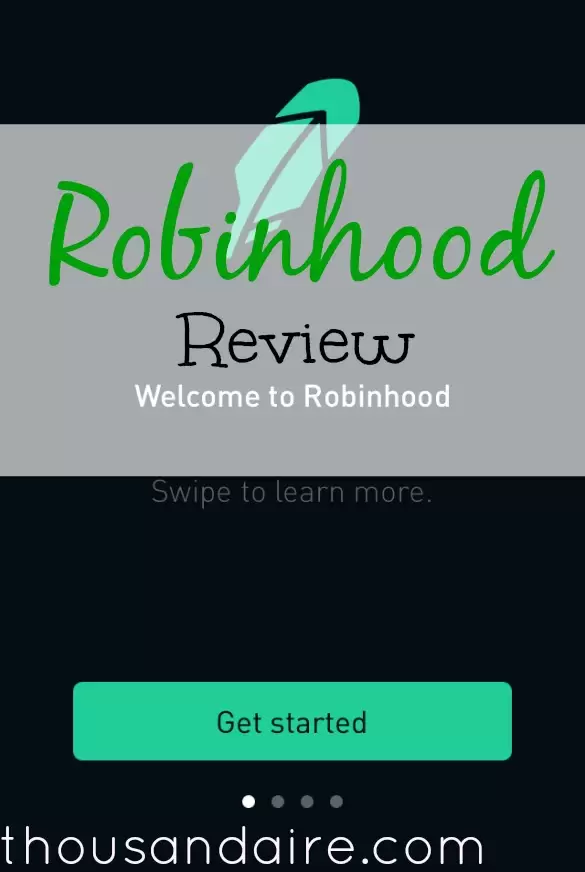 Robinhood has finally made its app available to Android users, and I can say I’m quite excited. Robinhood is a brokerage. If you open an account with them you can trade stocks online. There are two things that differentiate them from other discount brokers. First, regular trades on the platform don’t incur a commission. Second, you can’t place trades on your regular desktop computer. You can’t place them on your laptop either. This brokerage is available only on mobile devices as an app. The signup process is smooth and easy. Funding is a matter of giving the app your bank username and password which could turn off some users. All told completing the signup process took me about three minutes, which is a stunningly short amount of time.
Robinhood has finally made its app available to Android users, and I can say I’m quite excited. Robinhood is a brokerage. If you open an account with them you can trade stocks online. There are two things that differentiate them from other discount brokers. First, regular trades on the platform don’t incur a commission. Second, you can’t place trades on your regular desktop computer. You can’t place them on your laptop either. This brokerage is available only on mobile devices as an app. The signup process is smooth and easy. Funding is a matter of giving the app your bank username and password which could turn off some users. All told completing the signup process took me about three minutes, which is a stunningly short amount of time.
Fees
The main selling point behind the Robinhood app is free stock trades. A user may be surprised upon selling a stock that they actually do pay a small amount. This isn’t because Robinhood is charging them, but rather that the SEC (the Securities and Exchange Commision) charges a fee on stock sales, FINRA (Financial Industry Regulatory Authority) also charges a trading activity fee on stock sales. This should work out to pennies and largely isn’t worth worrying about. One of the things I like to check for in a broker is what the rest of their fees work out to be. For example, one fee that is generally overlooked is the fee to participate in a tender offer. This fee is $50 and is a substantial obstacle to participating in tender offers for microinvestors. Other fees include worthless security processing ($30) and various charges for doing things via paper rather than electronically ($5 for statements, $2 for trade confirmations).

(the best webcomic)
Available Trades
The trading universe that Robinhood gives you access to is fortunately much larger than similar services, such as Loyal3. Stocks available only include those traded on major US exchanges. They don’t trade OTC issues. The fortunate part about the setup is that if you don’t know what OTC issues you certainly don’t have any business trading them. Similarly, options are disallowed.
Customer Service
Customer service is quite easy to access via the app, it takes you directly to a mobile site. Customer support appears to encourage email over the phone. Phone customer service is only available during market hours. I sent an email to their customer service and have not as of yet gotten a reply. Robinhood has sent a couple automated messages claiming that their customer service has been overwhelmed by tickets since the Android launch.
Retirement Accounts
They don’t allow them. This is unfortunate, if a dollar can be out of your hands long enough to go into the stock market, it can be out of your hands long enough to go into a retirement account. That being said I’m not sure I would even want my retirement accounts at Robinhood. They seem nice enough but, I’m not convinced that their business model is sustainable in the long term. If it isn’t sustainable, they might get bought out, in which case I may end up at a firm with a totally different fee structure, or they’ll go out of business. If that happens, the good news is that they are covered by the SIPC, which ensures securities up to $250,000 from broker failure; the bad news is that this is a hell of a thing. If the brokerage goes under you may not be able to sell your holdings, or do much with them at all. If we’re in the sort of situation where a company like Robinhood goes out of business rather than being bought out you may find it quite upsetting that you can’t trade your holdings.
Bottom Line
Situationally, Robinhood could be great. Suppose that you want to have a diversified basket of stocks but don’t want to deal with the fees, tracking error, and turnover involved with an S&P 500 index fund. Instead, you could deposit $500 every month and buy $1 of each company in the S&P 500. You would simply never sell to avoid a turnover. That’s a very powerful idea and I like that it’s possible with Robinhood. Also, I’ve never had an easier time signing up for a financial account, which was great. The downsides are possibly substantial, as I am pretty skeptical that the company will exist in this form in twenty years. Additionally, not allowing retirement money very likely consigns the app to hold very small amounts of my money for the time being.
Adam Woods is a physicist. His research interests include building software to run and build geomagnetic models. Adam got interested in personal finance in the great recession when it became obvious an interest was necessary.
After harassing his friends and family (and a short intervention) he took to the web where he blogs about finance, investment, politics, and economics.
Adam is currently located in Boulder, Colorado where he can generally be found hiking, biking, or running a D&D campaign. He can also be contacted at adamwoods137@gmail.com.

I do not trust Robinhood. Its a Ponzi Scheme. They will go out of business with all our money. I hear them and say,… they no speaking the truth. How do you make money?
Thanks for taking the time to comment. My understanding is that they will make money from margin accounts, and earning interest on uninvested cash balances. I don’t think that it is a ponzi scheme, though they may have trouble maintaining this business model going forward. If you do have an account with them your funds are supposed to be segregated from the funds they use for operation. In any case SIPC insurance (kind of like the FDIC but for brokerages) will reimburse you for cash and securities that Robinhood holds if they go out of business (up to $250,000 in cash, and $500,000 in cash and securities). See http://www.sec.gov/answers/sipc.htm.